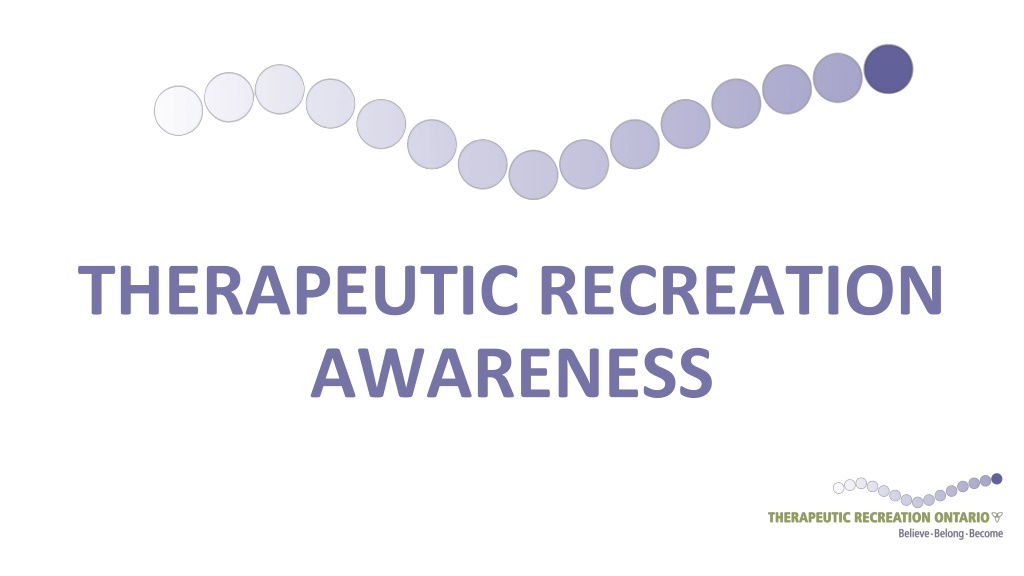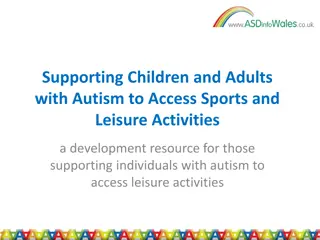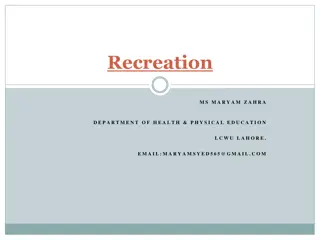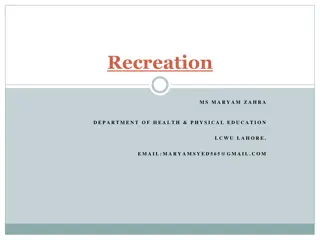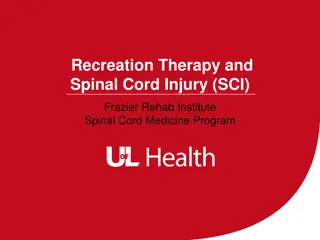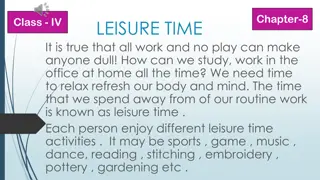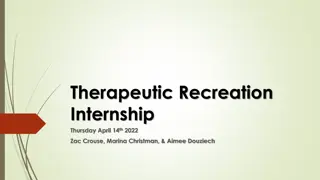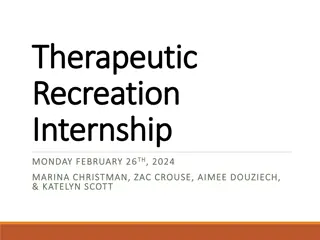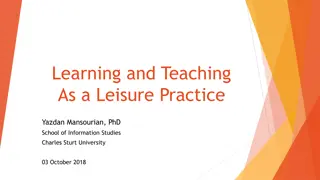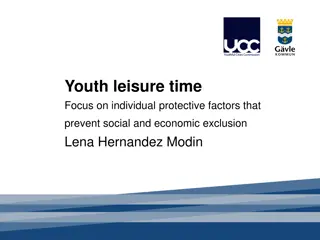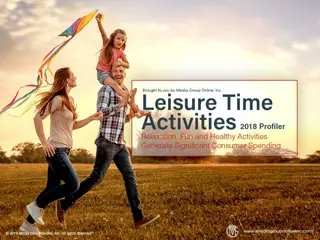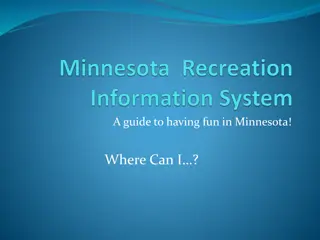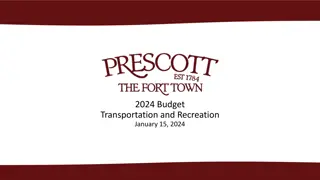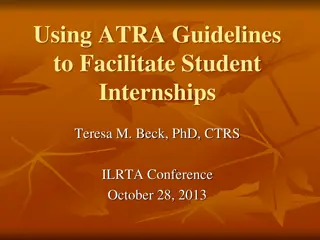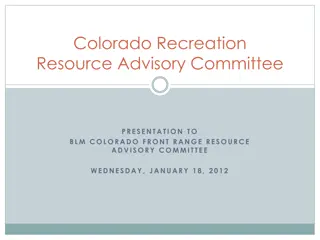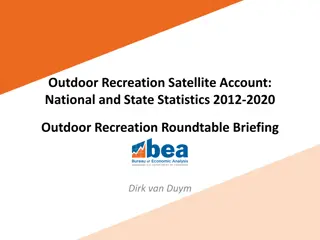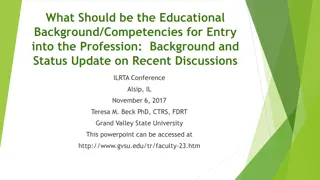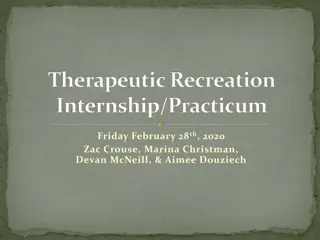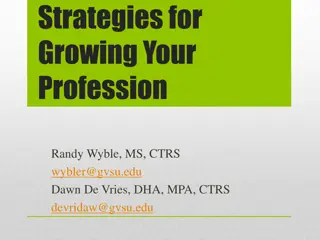Understanding Therapeutic Recreation: Enhancing Well-being through Leisure
Therapeutic Recreation, as defined by Therapeutic Recreation Ontario (TRO), aims to help individuals with physical, cognitive, emotional, or social limitations acquire skills to enjoy leisure optimally, function independently, and participate fully in society. It involves trained professionals offering interventions, leisure education, and recreation to promote quality of life. Various models of practice, such as the Strengths-Based Approach and Leisure Ability Model, guide Therapeutic Recreation professionals in supporting individuals to develop strengths and address their needs. Differentiating it from diversional therapy, Therapeutic Recreation focuses on enhancing well-being, nurturing relationships, and providing non-pharmacological interventions.
Download Presentation

Please find below an Image/Link to download the presentation.
The content on the website is provided AS IS for your information and personal use only. It may not be sold, licensed, or shared on other websites without obtaining consent from the author. Download presentation by click this link. If you encounter any issues during the download, it is possible that the publisher has removed the file from their server.
E N D
Presentation Transcript
THERAPEUTIC RECREATION AWARENESS
What is Therapeutic Recreation? Therapeutic Recreation Ontario (TRO) defines Therapeutic Recreation as a process that: Utilizes functional intervention, leisure education and recreation participation Enables persons with physical, cognitive, emotional and/or social limitations to acquire and/or maintain the skills, knowledge and behaviours that will allow them to enjoy their leisure optimally, function independently with the least amount of assistance and participate as fully as possible in society Is provided by trained professionals in clinical and/or community settings
Scope of Practice Therapeutic Recreation is a collaborative and purposeful process facilitated by trained professionals offering recreation and leisure assessment, planning, intervention and evaluation to achieve individual goals. The profession uses meaningful recreation and leisure education, counselling and experiences to promote, restore, rehabilitate and/or maintain quality of life and well-being. Therapeutic Recreation supports the development of strengths while addressing social, emotional, physical, spiritual and cognitive needs.
Common Models of Practice Ask your Recreation Therapist which model they use! Strengths-Based Approach (Anderson & Heyne, 2012) Leisure and Well-Being Model (Carruthers & Hood, 2007) The Leisure Ability Model (Stumbo & Peterson, 2009) The strengths-based approach utilized in Therapeutic Recreation focuses on an individuals internal and external strengths for optimizing an individual s quality of life. The Leisure and Well-Being Model (LWM) is a strengths- based therapeutic recreation service delivery model that provides a theoretical framework for TR practice designed to facilitate clients development of the skills, knowledge, and resources essential to well-being. There are 3 main components to The Leisure Ability Model: Recreation Participation Leisure Education Functional Intervention
Therapeutic Recreation Is NOT Therapeutic Recreation is NOT: Diversional Therapy Activity for the sake of being busy A distraction
Therapeutic Recreation IS Therapeutic Recreation IS: The difference between living vs. surviving/existing Maintaining continuity in life through valued activities as well as opportunities to grow and develop by discovering new abilities and learning new skills and talents Developing and nurturing strong relationships critical for quality care and support Providing non-pharmacological interventions All through learning a person s story, identifying their strengths and challenges and connecting them to meaningful and authentic leisure experiences.
Who do we serve? Where do we work? Where do we work? Who do we work with? Hospitals Older Adults Long Term Care facilities Mental Health Community Pedeatrics Day programs Private Practice Children Centres Physical Rehabilitation.
What training do QUALIFIED TR professionals have? TRs can choose to enroll in either a University or College Program 3 Degree Programs in Ontario 10 Diploma Programs (including 4 certificate programs) in Ontario TRO has developed a designation called the R/TRO - The R/TRO is a voluntary designation in which a qualified TR practitioner completes an application outlining a blend of education and demonstrated standards of practice that are then reviewed by a committee of peer volunteers - Once received, successful recipients must complete a maintenance process every 5 years, demonstrating continued engagement in the profession and standards of practice.
Benefits of Therapeutic Recreation Decrease in responsive behaviours Improvement of cognitive abilities Decreased in loneliness, boredom and depression Sense of Belonging Increased Sense of self worth Improvement in overall Quality of Life and Wellbeing Increased Functional Independence Increased physical activity Decrease stress levels Reduces Hospital re-admission rates Improves feelings of joy
Benefits of Therapeutic Recreation continued TR and active living are essential to personal health; a key determinant of health status TR is a key to balanced human development helping Canadians reach for their potential TR is essential to QUALITY OF LIFE TR reduces self-destructive and anti-social behaviour
References Anderson, L., & Heyne, L. (2012). Therapeutic Recreation Practice: A Strengths Approach. State College, PA: Venture Publishing Austin, D.R. (1998). The Health Promotion/Health Promotion Model. Therapeutic Recreation Journal, 32, 109 117. Hood, C., & Carruthers, C. (2007). Enhancing leisure experience and developing resources: Leisure and Well Being Model, Part II. Therapeutic Recreation Journal (41) 298-325. Leisure Information Network (2017). Benefits of Therapeutic Recreation. Retrieved from http://www.lin.ca/resource/html/bencat.htm Stumbo, N.J., & Peterson, C.A. (2009). Therapeutic Recreation Program Design, 5thed. San Francisco, CA: Pearson Education, Inc.
